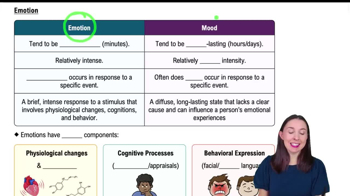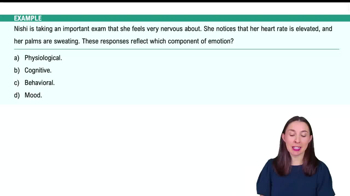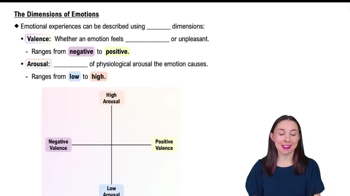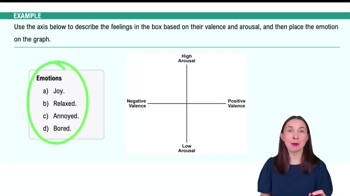Table of contents
- 1. Introduction to Psychology1h 43m
- 2. Psychology Research2h 20m
- 3. Biological Psychology2h 41m
- 4. Sensation and Perception28m
- 5. Consciousness and Sleep32m
- 6. Learning41m
- 7. Memory34m
- 8. Cognition37m
- 9. Emotion and Motivation35m
- 10. Developmental Psychology33m
- 11. Personality48m
- 12. Social Psychology41m
- 13. Stress and Health41m
- 14. Psychological Disorders44m
- 15. Treatment47m
9. Emotion and Motivation
Emotion
Struggling with Psychology?
Join thousands of students who trust us to help them ace their exams!Watch the first videoMultiple Choice
True or False: If false, choose the answer that best corrects the statement.
The valence of an emotion is how intense the emotion feels.
A
True.
B
False; valence is a measure of physiological arousal.
C
False; valence is a measure of how long the emotion lasts.
D
False; valence is how pleasant an emotion is.
 Verified step by step guidance
Verified step by step guidance1
Understand the concept of 'valence' in the context of emotions. Valence refers to the intrinsic attractiveness or aversiveness of an emotional experience. It is essentially about how pleasant or unpleasant an emotion is.
Recognize that the statement given is about the 'valence' of an emotion, which is incorrectly defined as the intensity of the emotion.
Identify the options provided to correct the statement. Each option offers a different definition of valence.
Evaluate each option: The first option suggests valence is about physiological arousal, which is incorrect as arousal refers to the intensity or activation level of an emotion. The second option suggests valence is about the duration of the emotion, which is also incorrect.
Conclude that the correct correction is: 'False; valence is how pleasant an emotion is,' as this accurately describes the concept of valence in emotional psychology.
Related Videos
Related Practice
















